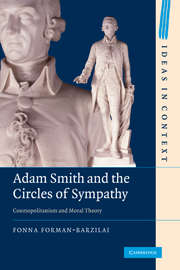Book contents
- Frontmatter
- Contents
- Acknowledgments
- Introduction: Smith's oikeiōsis
- PART I THE CIRCLE OF THE SELF
- PART II THE CIRCLE OF SOCIETY
- PART III THE CIRCLE OF HUMANITY
- 5 Sympathy in space
- 6 The commercial cosmopolis
- 7 Negative justice
- Conclusion: cultural pluralism, moral goods, and the “laws of nations”
- Bibliography
- Index
- IDEAS IN CONTEXT
6 - The commercial cosmopolis
Published online by Cambridge University Press: 03 May 2010
- Frontmatter
- Contents
- Acknowledgments
- Introduction: Smith's oikeiōsis
- PART I THE CIRCLE OF THE SELF
- PART II THE CIRCLE OF SOCIETY
- PART III THE CIRCLE OF HUMANITY
- 5 Sympathy in space
- 6 The commercial cosmopolis
- 7 Negative justice
- Conclusion: cultural pluralism, moral goods, and the “laws of nations”
- Bibliography
- Index
- IDEAS IN CONTEXT
Summary
Sometimes I am jostled among a Body of Americans; sometimes I am lost in a Crowd of Jews, and sometimes in a Group of Dutch-men. I am a Dane, a Swede, or Frenchman at different times, or rather fancy myself like the old Philosopher, who upon being asked what country-man he was, replied that he was a Citizen of the World.
Joseph Addison, The Spectator (19 May 1711), on a visit to the Royal Exchange in LondonThroughout I have emphasized Smith's focus on social order, and his desire to harmonize tensions between self and others. I ultimately argued that Smith's reconciliation of this tension through the apparatus of moral psychology yielded an acute localism that is bound to strike twenty-first-century interpreters reflecting on global interconnectedness as an insightful and finely textured theory of social coordination, but also an unsatisfying theory of, even an obstacle to, society in broader spaces.
In this chapter I shall extend my argument in two related ways. First, I will economize the tension Smith described throughout the Moral Sentiments between self and society, describing it here as a tension between economy and ethics. Clearly, this is an old subject. The tension between Adam Smith's ethical and economic thought first became a “problem” for European scholarship in the closing years of the nineteenth century, and turned on the extent that Smith's Wealth of Nations (1776) arose conceptually from the ethical framework developed in the Moral Sentiments? (1759).
- Type
- Chapter
- Information
- Adam Smith and the Circles of SympathyCosmopolitanism and Moral Theory, pp. 196 - 217Publisher: Cambridge University PressPrint publication year: 2010

